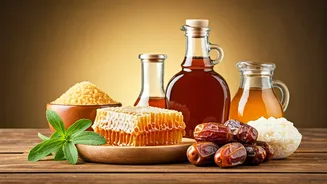Diabetes & Sugar
Diabetes is a chronic condition that affects how your body processes blood sugar (glucose). Insulin, a hormone made by the pancreas, helps glucose from
food get into your cells to be used for energy. With diabetes, either the body doesn't make enough insulin or can't effectively use the insulin it makes. This leads to high blood sugar levels, which over time can cause serious health problems like heart disease, vision loss, and kidney disease. Managing diabetes often involves diet changes, regular exercise, and sometimes medication. One of the main dietary changes is to reduce or eliminate refined sugar from your diet, which is where natural sweeteners can be helpful.
Stevia: Natural Choice
Stevia is a natural sweetener derived from the stevia plant. It's significantly sweeter than sugar but has zero calories, making it a popular choice for people with diabetes or those looking to manage their weight. It is generally safe for people with diabetes because it doesn't raise blood sugar levels. Stevia extracts are also heat-stable, allowing them to be used in cooking and baking. However, some people may experience a bitter aftertaste. When using stevia, it's essential to check the ingredient list, as some products may contain added sugars or sugar alcohols. Look for pure stevia extracts to maximize the benefits and ensure it aligns with your health goals.
Honey: Natural Sweetener
Honey is a natural sweetener that has been used for centuries. It contains small amounts of vitamins, minerals, and antioxidants. Although honey is sweeter than sugar, it has a lower glycemic index (GI), which means it might cause a slower rise in blood sugar levels. However, it still contains carbohydrates and calories, so moderation is key, especially for individuals managing diabetes. Choose raw, unprocessed honey for the most health benefits. It's also important to note that honey should not be given to infants under one year of age due to the risk of botulism. When using honey, consider its overall impact on your daily carbohydrate intake and blood sugar control.
Maple Syrup Benefits
Maple syrup is another natural sweetener derived from the sap of maple trees. It contains some minerals, such as manganese and zinc. Maple syrup also has a moderate GI compared to refined sugar. Always choose pure maple syrup, as it's free from additives and artificial ingredients. While maple syrup is a better choice compared to refined sugar, it still contributes to carbohydrate intake and calories. Moderation is important, especially for people with diabetes. Look for pure maple syrup on the label to maximize the health benefits and keep an eye on portion sizes to maintain healthy blood sugar levels.
Coconut Sugar Uses
Coconut sugar is made from the sap of coconut palm trees and is often marketed as a healthier alternative to regular sugar. It contains some nutrients like iron, zinc, and antioxidants. Coconut sugar has a slightly lower GI than table sugar, but it's still relatively high. It's important to know that the impact on blood sugar varies for different people. While coconut sugar is a better choice compared to refined sugar, it still contributes to carbohydrate intake and calories. Always remember moderation is important when you use it, especially for people with diabetes. You must also consider its overall impact on your daily carbohydrate intake and blood sugar control.
Dates: Sweet Option
Dates are a naturally sweet fruit that can be used as a sweetener. They contain fiber, which can help slow down the absorption of sugar, potentially leading to a more controlled blood sugar response. Dates also provide essential nutrients such as potassium, magnesium, and antioxidants. Dates are very high in natural sugar, so portion control is important. You can use dates in various ways, such as in smoothies, baked goods, or as a natural sweetener in homemade energy bars. Always remember to consider the overall carbohydrate content of dates in your daily diet and their impact on your blood sugar levels, especially if you have diabetes.
Xylitol and Erythritol
Xylitol and erythritol are sugar alcohols that can be used as sugar substitutes. Xylitol is found naturally in many fruits and vegetables. It has a low glycemic index and fewer calories compared to sugar. Erythritol has an even lower GI and fewer calories than xylitol. Both don't significantly raise blood sugar levels, making them suitable choices for people with diabetes. It's important to use these sugar alcohols in moderation, as high consumption can cause digestive issues like bloating or diarrhea. Always read the labels to ensure the product is suitable for your dietary needs. These sugar alcohols are a great choice when used in moderation as part of a balanced diet.














